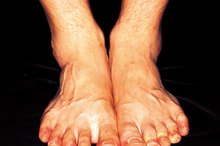Edema in Malnutrition
Your body uses a number of processes to maintain normal fluid balance. This balance requires that you get the proper intake of certain nutrients and electrolytes to keep your body running at its best. Without these nutrients, you may experience a condition known as edema, which occurs when fluids begin to build up improperly in your tissues, causing abnormal swelling of your extremities or other body parts. Because malnutrition is a serious condition, failing to correct malnutrition and edema can have life-threatening consequences.
Protein
Protein is the most common cause of malnutrition-related edema in the body. This is because albumin, a protein, is one of the largest components in your blood. When you have the right amount of albumin in your blood, your body can maintain a balance, keeping water out. Without enough protein, however, your cells may begin to retain water, which leads to edema.
- Protein is the most common cause of malnutrition-related edema in the body.
- This is because albumin, a protein, is one of the largest components in your blood.
Organ Dysfunction
Fluid Buildup in the Calf
Learn More
A number of organs, mainly your kidneys and liver, are responsible for acting as filters for your body. They toxins and byproducts of nutrient breakdown from your blood, helping to maintain a desirable balance in your body. If you do not take in enough nutrients in your daily diet due to malnutrition -- including minerals such as sodium and potassium -- your body may not be able to get rid of water properly. The excess water can then build up in your tissues, leading to edema. This malnutrition type is often accompanied by other symptoms, such as muscle weakness, dizziness and unexplained fatigue.
- A number of organs, mainly your kidneys and liver, are responsible for acting as filters for your body.
Treatment
If you experience malnutrition-related edema, you must take steps to reduce the underlying cause while reducing the edema. To treat your edema, try wearing support stockings. If your legs or arms are swollen, elevating them can encourage the excess water to flow away from the swollen area. Treating malnutrition involves identifying the nutrients that are deficient in your diet. Protein is one of the most common deficiencies, especially if you are following a vegetarian diet. Even if you do not get protein from sources such as meats or eggs, you can blend protein shakes to increase your intake. If malnutrition is due to a medical condition that leaves you unable to break down proteins, your doctor can recommend measures to improve your health whenever possible.
- If you experience malnutrition-related edema, you must take steps to reduce the underlying cause while reducing the edema.
- If malnutrition is due to a medical condition that leaves you unable to break down proteins, your doctor can recommend measures to improve your health whenever possible.
Warning
Edema & Protein
Learn More
If you experience malnutrition-related edema, seek immediate medical attention if the area where you experience swelling is painful, red or hot to the touch. If you have an open sore on a limb with edema or only one limb is swollen, these also can indicate a more serious condition that requires medical treatment.
Related Articles
References
- University of Minnesota Children's Hospital; Center for Global Pediatrics; Protein Energy Malnutrition; Cindy Howard, MD, MPHTM; November 2008
- Cleveland Clinic; Edema; November 2007
- Dinkelmann Health Center: Edema and Protein
- Adukauskiene D, Bivainyte A, Radaviciūte E. Cerebral edema and its treatment. Medicina (Kaunas). 2007;43(2):170-6.
- Cleveland Clinic. Edema.
- Ely, JW, Osheroff JA, Chamblis ML, et al. Approach to Leg Edema of Unclear Etiology. J Am Board Fam Med March 2006, 19 (2) 148-160; DOI: 10.3122/jabfm.19.2.148
- Familydoctor.org. Edema.
- Mayo Clinic. Pulmonary edema.
- Medline Plus. Edema.
- Medline Plus. Pulmonary Edema.
- National Eye Institute. Facts About Macular Edema.
- NCBI Bookshelf. Causes and signs of edema.
- Porter D. What is Macular Edema?
Writer Bio
Rachel Nall began writing in 2003. She is a former managing editor for custom health publications, including physician journals. She has written for The Associated Press and "Jezebel," "Charleston," "Chatter" and "Reach" magazines. Nall is currently pursuing her Bachelor of Science in Nursing at the University of Tennessee.









